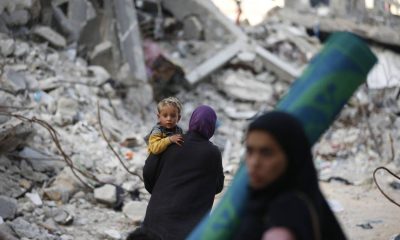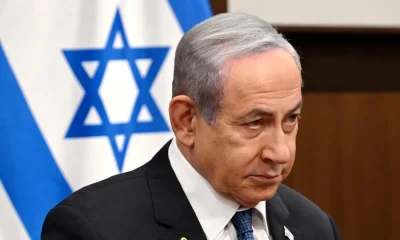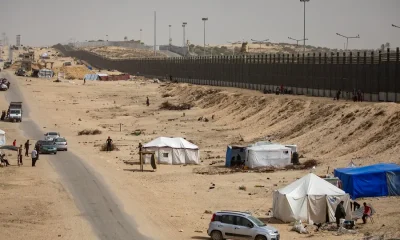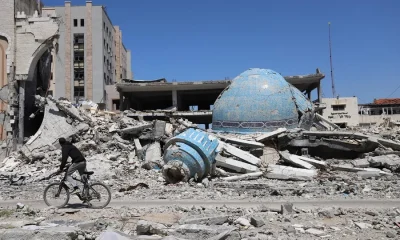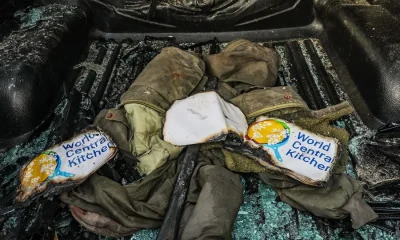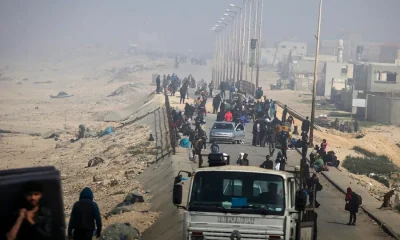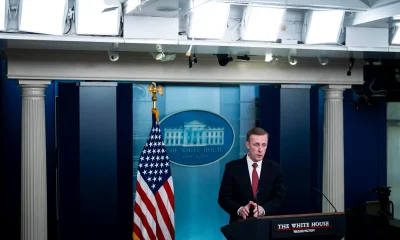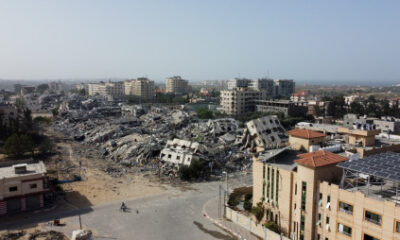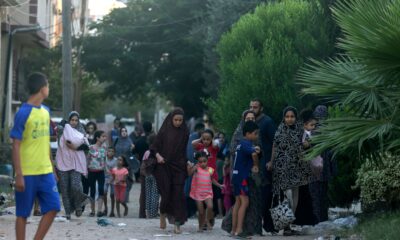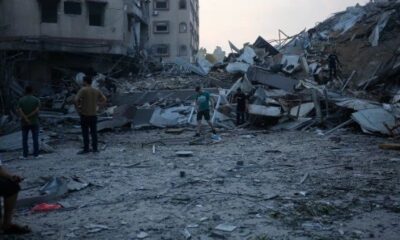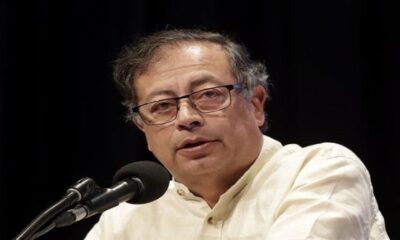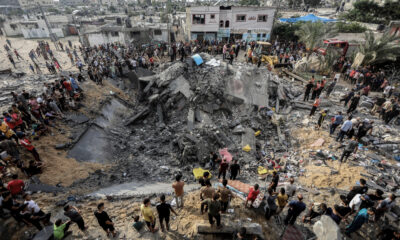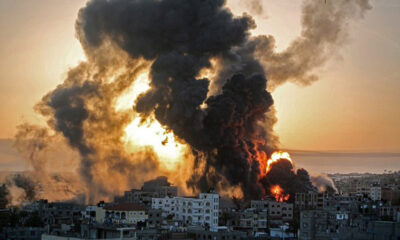International
Hamas asks to investigate Israel’s abuses and torture of Palestinians imprisoned in Gaza
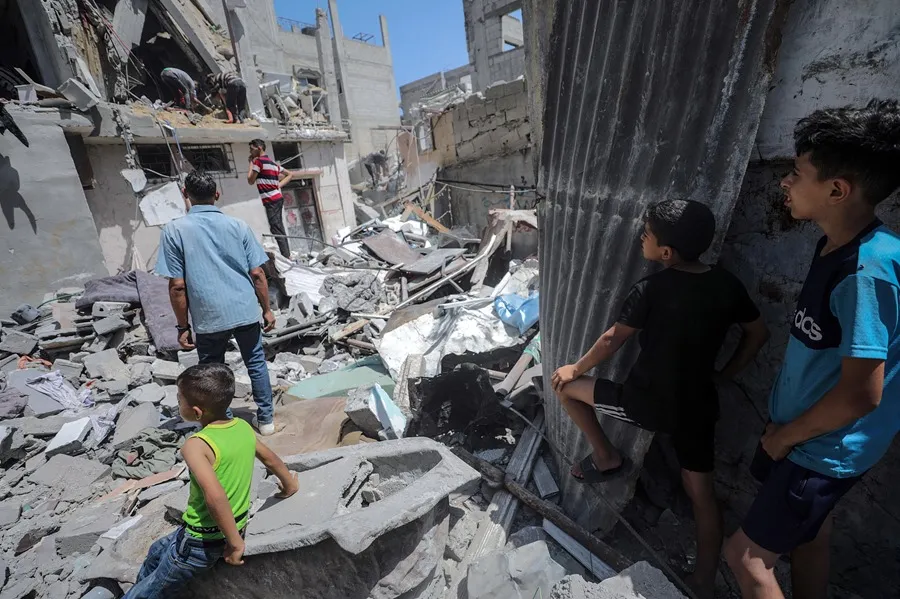
The Islamist group Hamas has called on the international community, and especially the International Committee of the Red Cross, to investigate cases of abuse and torture in Israeli detention centers against detained Gazans, as denounced by pro-human rights groups.
“The horrible testimonies about the conditions of the Palestinian detainees in the Zionist prisons continue, the last of which was that of several Palestinians kidnapped in Gaza and released today from the Zionist military prison ‘Sde Teman’,” Hamas said in a statement last night.
“Human rights institutions, in particular the International Committee of the Red Cross, must work to follow up on the conditions of the Palestinian arrested in these fascist detentions and put an end to the serious violations to which they are exposed,” he added.
His words come hours after a young Palestinian, allegedly released from Sde Teman, where he was detained for a month by Israel, was recorded yesterday in a hospital in a state of shock, barely unable to speak coherently and with signs of torture on his wrists and ankles.
On March 7, the Israeli media Haaretz denounced that at least 27 people detained in the Gaza Strip and placed in Israeli military custody had died since the beginning of the war on October 7, either at the Sde Teiman military base, the Anatot detention camp or during interrogations.
Already in December, Haaretz revealed that those arrested in Sde Teiman could remain handcuffed and blindfolded for whole days, and an internal source assured that soldiers tended to mistreat prisoners, which coincides with the testimonies of other freed Palestinians
Meanwhile, the Israeli Army intensified its attacks and incursions in the heart of the city of Rafah, south of Gaza, on Friday, with the destruction of residential neighborhoods and hand-to-hand fighting with Hamas militiamen.
As Palestinian sources confirmed to EFE, the attacks are now concentrated in Al Auda, in the center of the city of Rafah, and in Tal al Sultan, a neighborhood in the northwest.
“The whole city of Rafah is an area of Israeli military operations,” Ahmed al Sofi, mayor of Rafah, said today in a statement released by Hamas on Telegram. “The city is experiencing a humanitarian catastrophe and people are dying inside its tents due to the Israeli bombings.”
According to the mayor, there is no medical center left in operation in the city and the residents and displaced people – according to UNRWA about 65,000 people, of the 1.4 million Gazans that the city was homed before the offensive – cannot cover their daily needs for food and water.
The third point of intense military activity, as local sources reported to EFE, is still the so-called Philadelphia corridor, the border line with Egypt that Israel aspires to control, according to military sources, in order to cut the network of tunnels that supplies Hamas helps it both to rearm and attack.
Since this morning, at least 22 people have died in the Strip, according to medical sources, including five municipal workers, including the head of the emergency service, denounced the city council of Rafah.
Fatal attacks were also recorded in Zeitun, in the northern city of Gaza, which caused at least eight deaths, and in the central areas of Nuseirat and Deir el Balah, according to the Palestinian agency Wafa.
In the north, the lack of food and food is still a critical issue. According to UN data, of the 61 coordinated humanitarian assistance missions north of Gaza, only 28 – 46% – were facilitated by the Israeli authorities.
The reality in the enclave is that only a tiny minority can eat on a regular basis, in the absence of food or affordable prices. Many do it once a day and there is a lack of milk and porridge, denounce organizations on the ground.
The NGO Doctors Without Borders warned today of the psychological trauma that the war is causing to the children of Gaza, who are losing the desire to continue living surrounded by so much death.
“What we are seeing in young children, especially, are symptoms of depression because they have lost everything. They have lost their parents, their siblings, their home, their toys, everything that made their daily life normal,” the organization said in a statement.
International
U.S. Senate Rejects Budget, Bringing Government Closer to Shutdown Amid DHS Dispute

The U.S. Senate voted on Thursday against a budget proposal in a move aimed at pressuring changes at the Department of Homeland Security (DHS), following the killing of two civilians during a deployment of immigration agents in Minneapolis.
All Senate Democrats and seven Republican lawmakers voted against the bill, which requires 60 votes to advance, pushing the country closer to a partial government shutdown that would cut funding for several agencies, including the Pentagon and the Department of Health.
The rejection came as Senate leaders and the White House continue negotiations on a separate funding package for DHS that would allow reforms to the agency. Proposed measures include banning Immigration and Customs Enforcement (ICE) agents from wearing face coverings and requiring them to use body-worn cameras during operations.
The vote took place just hours after President Donald Trump said he was “close” to reaching an agreement with Democrats and did not believe the federal government would face another shutdown, following last year’s record stoppage.
“I don’t think the Democrats want a shutdown either, so we’ll work in a bipartisan way to avoid it. Hopefully, there will be no government shutdown. We’re working on that right now,” Trump said during a Cabinet meeting at the White House.
International
Trump Says Putin Agreed to One-Week Halt in Attacks on Ukraine Amid Extreme Cold

U.S. President Donald Trump said on Thursday that he secured a commitment from Russian President Vladimir Putinto halt attacks against Ukraine for one week, citing extreme weather conditions affecting the region.
“Because of the extreme cold (…) I personally asked Putin not to attack Kyiv or other cities and towns for a week. And he agreed. He was very pleasant,” Trump said during a Cabinet meeting broadcast by the White House.
Trump acknowledged that several advisers had questioned the decision to make the call.
“A lot of people told me not to waste the call because they wouldn’t agree. And he accepted. And we’re very happy they did, because they don’t need missiles hitting their towns and cities,” the president said.
According to Trump, Ukrainian authorities reacted with surprise to the announcement but welcomed the possibility of a temporary ceasefire.
“It’s extraordinarily cold, record cold (…) They say they’ve never experienced cold like this,” he added.
Ukrainian President Volodymyr Zelensky later commented on the announcement, expressing hope that the agreement would be honored.
International
Storm Kristin Kills Five in Portugal, Leaves Nearly 500,000 Without Power

Storm Kristin, which battered Portugal with heavy rain and strong winds early Wednesday, has left at least five people dead, while nearly half a million residents remained without electricity as of Thursday, according to updated figures from authorities.
The revised death toll was confirmed to AFP by a spokesperson for the National Emergency and Civil Protection Authority (ANPEC). On Wednesday, the agency had reported four fatalities.
Meanwhile, E-Redes, the country’s electricity distribution network operator, said that around 450,000 customers were still without power, particularly in central Portugal.
Emergency services responded to approximately 1,500 incidents between midnight and 8:00 a.m. local time on Wednesday, as the storm caused widespread disruptions.
The Portuguese government described Kristin as an “extreme weather event” that inflicted significant damage across several regions of the country. At the height of the storm, as many as 850,000 households and institutions lost electricity during the early hours of Wednesday.
Several municipalities ordered the closure of schools, many of which remained shut on Thursday due to ongoing adverse conditions.
Ricardo Costa, regional deputy commander of the Leiria Fire Brigade, said residents continue to seek assistance as rainfall persists.
“Even though the rain is not extremely intense, it is causing extensive damage to homes,” he noted.
In Figueira da Foz, a coastal city in central Portugal, strong winds toppled a giant Ferris wheel, underscoring the severity of the storm.
-

 Central America3 days ago
Central America3 days agoGuatemala seizes over a ton of cocaine hidden in flour at Pacific port
-

 International4 days ago
International4 days agoDelcy Rodríguez seeks political agreements after Maduro’s ouster
-

 International3 days ago
International3 days agoHistoric snowstorm paralyzes Toronto after 60 centimeters of snow
-

 International3 days ago
International3 days agoSpain’s irregular migrant population rises to 840,000, study finds
-

 Central America2 days ago
Central America2 days agoGuatemala Police Arrest Prison Guard Caught in the Act of Extortion
-

 Central America2 days ago
Central America2 days agoHonduras swears in conservative president Asfura after disputed election
-

 International4 days ago
International4 days agoFederal immigration agents kill man in Minneapolis, sparking protests and outrage
-

 International24 hours ago
International24 hours agoFootball Fan Killed in Clashes After Colombian League Match
-

 Central America2 days ago
Central America2 days agoBukele leads public trust rankings as UCA survey highlights gains in security
-

 International2 days ago
International2 days agoWinter Storm Fern Leaves 30 Dead and Over One Million Without Power Across the U.S.
-

 Sin categoría2 days ago
Sin categoría2 days agoEight Killed in Series of Armed Attacks in Ecuador’s Manabí Province
-

 International2 days ago
International2 days agoDoomsday clock moves to 85 seconds before midnight amid rising global risks
-

 International3 days ago
International3 days agoRights group says nearly 6,000 killed in Iran protest crackdown
-

 International24 hours ago
International24 hours agoRubio Says U.S. Could Participate in Follow-Up Russia-Ukraine Talks
-

 International2 days ago
International2 days agoSpain approves plan to regularize up to 500,000 migrants in Historic Shift
-

 International24 hours ago
International24 hours agoMissing Spanish Sailor Rescued After 11 Days Adrift in Mediterranean
-

 Sin categoría2 days ago
Sin categoría2 days agoEl Salvador Launches Fourth Year of Ocean Mission to Protect Marine Ecosystems
-

 Central America24 hours ago
Central America24 hours agoGuatemala President Says Starlink Terminal Found Inside Prison
-

 International3 days ago
International3 days agoVenezuela frees at least 80 political prisoners, NGO says
-

 International3 days ago
International3 days agoEU launches new probe into X over AI-generated fake nude images
-

 International3 days ago
International3 days agoSevere winter storm grips U.S., leaves multiple dead as extreme cold persists
-

 International3 days ago
International3 days agoFrance debates ban on social media for children under 15
-

 International39 minutes ago
International39 minutes agoMan Arrested After Vehicle Crashes Into Jewish Institution in Brooklyn
-

 International37 minutes ago
International37 minutes agoStorm Kristin Kills Five in Portugal, Leaves Nearly 500,000 Without Power
-

 International33 minutes ago
International33 minutes agoU.S. Senate Rejects Budget, Bringing Government Closer to Shutdown Amid DHS Dispute
-

 International36 minutes ago
International36 minutes agoTrump Says Putin Agreed to One-Week Halt in Attacks on Ukraine Amid Extreme Cold

























